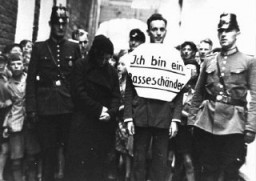You searched for: propaganda
<< Previous | Displaying results 276-300 of 342 for "propaganda" | Next >>
-
The Rwanda Genocide
ArticleFrom April to July 1994, extremist leaders of Rwanda’s Hutu majority directed a genocide against the country’s Tutsi minority. Learn more

-
Reichstag Fire Decree
Timeline EventFebruary 28, 1933. On this date, President Hindenburg issued the Decree for the Protection of People and the Reich, also known as the Reichstag Fire Decree.
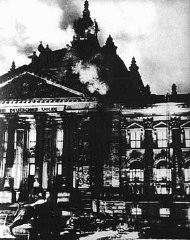
-
International Military Tribunal
Timeline EventNovember 20, 1945. On this date, the International Military Tribunal in Nuremberg, Germany, began the trials of 21 major Nazi leaders.
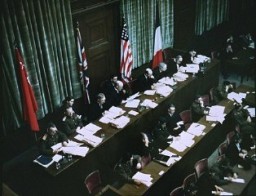
-
Women’s Suffrage is Declared in Germany
Timeline EventNovember 12, 1918. On this date, women gain the right to vote in Germany.
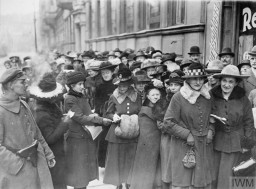
-
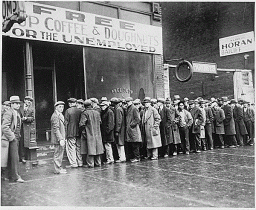
-
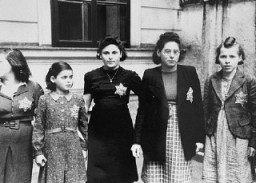
-
Ohrdruf
ArticleThe Ohrdruf camp was a subcamp of the Buchenwald concentration camp, and the first Nazi camp liberated by US troops.
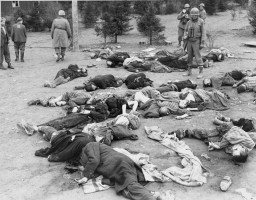
-
Frank Liebermann
ArticleExplore Frank Liebermann’s biography and learn about his experiences of antisemitism in his home town in Germany before World War II.
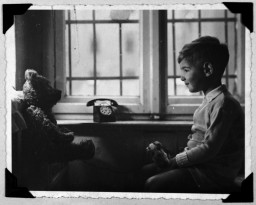
-
The Farhud
ArticleThe Farhud (pogrom), an outbreak of mob violence against Baghdad Jewry in June 1941, was a turning point in the history of Jews in Iraq. Learn more
-
Nazi Racism
ArticleNazi racism and racial antisemitism ultimately led to mass murder and genocide. Learn more about Nazi racial ideology.
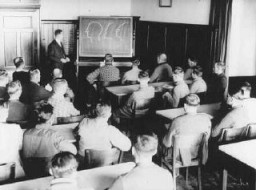
-
Masza Tenenbaum
ID CardThe youngest of three children, Masza was born to Jewish parents living 35 miles east of Warsaw in the small predominantly Jewish town of Kaluszyn. Her father owned a shop where he sold cosmetics and non-prescription medicines. Masza was close friends with a group of Jewish teenagers who went to the same public school and who spent much of their free time and vacations together. 1933-39: Majlich, Sara, and the rest of Masza's group have always liked discussing politics as they strolled down the main…
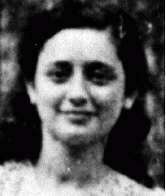
-
Majlech Kisielnicki
ID CardThe second of three children, Majlech was born to Jewish parents living 35 miles east of Warsaw in the small, predominantly Jewish town of Kaluszyn. Majlech's father owned a wholesale grocery store, a restaurant and a gas station, all of which were located on the heavily traveled main road. Majlech attended public elementary school and also received religious instruction. 1933-39: Majlech and his pals, Mindele, Sara and Adam loved to discuss politics. They'd heard the Polish propaganda claiming that…
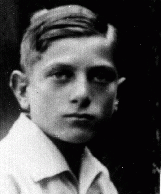
-
Jozef Tiso
ArticleJozef Tiso was a Slovak politician and a Roman Catholic priest. From 1939 to 1945, he was the president of the Slovak Republic, one of Nazi Germany’s allies.
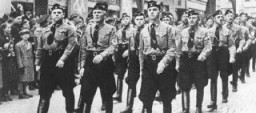
-
Olympic Games in Berlin
FilmThe 1936 Summer Olympic Games were held in Berlin. For two weeks, Adolf Hitler camouflaged his antisemitic and expansionist agenda while hosting the games. Hoping to impress the many foreign visitors who were in Germany for the games, Hitler authorized a brief relaxation in anti-Jewish activities (including the removal of signs barring Jews from public places). The games were a resounding propaganda success for the Nazis. They presented foreign spectators with the image of a peaceful and tolerant Germany.…
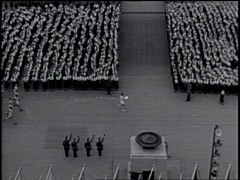
-
Opening of 1936 Summer Olympic Games
FilmIn 1933, Nazi Party leader Adolf Hitler became chancellor of Germany and quickly turned the nation's fragile democracy into a one-party dictatorship. Police rounded up thousands of political opponents, detaining them without trial in concentration camps. The Nazi regime also put into practice racial policies that aimed to "purify" and strengthen the Germanic "Aryan" population. A relentless campaign began to exclude Germany's one-half million Jews from all aspects of German life. For two weeks in August…
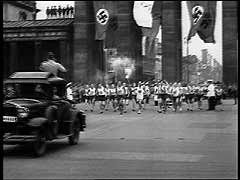
-
Joseph Maier describes Hermann Göring at Nuremberg
Oral HistoryJoseph immigrated to the United States in 1933 after finishing university in Leipzig. His parents and brother had left Germany earlier for the United States. Joseph attended Columbia University. From 1940 to 1943 he was assistant editor for a New York German-Jewish newspaper. In 1944, he worked in the American embassy in Britain as a propaganda analyst. He went to Nuremberg, Germany, as an interpreter in 1946. He analyzed materials and transcripts, and participated in many interrogations for the Nuremberg…
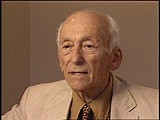
-
Joseph Maier describes Hjalmar Schacht at the Nuremberg trial
Oral HistoryJoseph immigrated to the United States in 1933 after finishing university in Leipzig. His parents and brother had left Germany earlier for the United States. Joseph attended Columbia University. From 1940 to 1943 he was assistant editor for a New York German-Jewish newspaper. In 1944, he worked in the American embassy in Britain as a propaganda analyst. He went to Nuremberg, Germany, as an interpreter in 1946. He analyzed materials and transcripts, and participated in many interrogations for the Nuremberg…
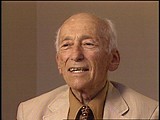
-
Joseph Maier describes former Auschwitz commandant Rudolf Hoess at the Nuremberg trial
Oral HistoryJoseph immigrated to the United States in 1933 after finishing university in Leipzig. His parents and brother had left Germany earlier for the United States. Joseph attended Columbia University. From 1940 to 1943 he was assistant editor for a New York German-Jewish newspaper. In 1944, he worked in the American embassy in Britain as a propaganda analyst. He went to Nuremberg, Germany, as an interpreter in 1946. He analyzed materials and transcripts, and participated in many interrogations for the Nuremberg…
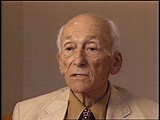
-
Hainewalde
ArticleThe SA established a protective custody camp at Hainewalde in March 1933. Well-known journalist and writer Axel Eggebrecht was among its early prisoners.
-
Third Reich
ArticleThe “Third Reich” is another name for Nazi Germany between 1933-1945. Learn more about life under Nazi rule before and during World War II.
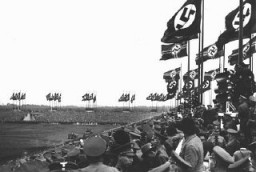
-
Theresienstadt: Key Dates
ArticleExplore key dates in the history of the Theresienstadt camp/ghetto, which served multiple purposes during its existence from 1941-45.
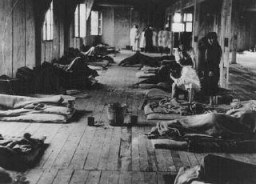
-
Supreme Court Decision on the Nuremberg Race Laws
ArticleLearn more about the 1936 German Supreme Court decision on the Nuremberg Race Laws.
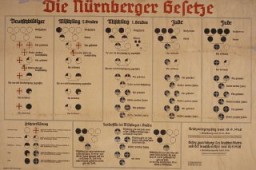
-
Anti-Jewish Legislation in Prewar Germany
ArticleNazi anti-Jewish laws began stripping Jews of rights and property from the start of Hitler’s dictatorship. Learn about antisemitic laws in prewar Germany.
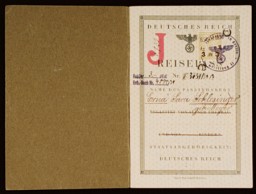
-
Paul von Hindenburg
ArticlePaul von Hindenburg was President of the Weimar Republic from 1925 until his death in 1934. Learn more about his life and role in the Nazi rise to power.
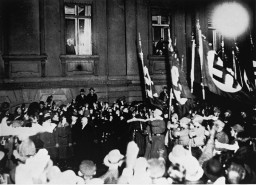
-
Public Humiliation
ArticleThe Nazis used public humiliation tactics to degrade their victims and to reinforce Nazi racial ideology for German citizens and populations under Nazi occupation.
